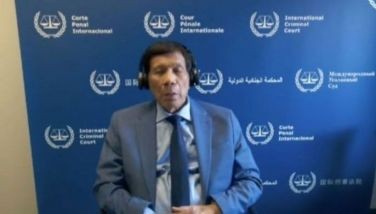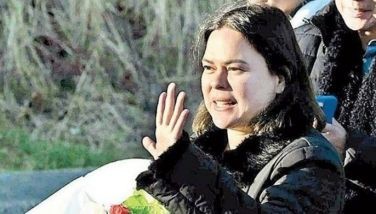Mabini in the Rosales Saga

This July 23, we celebrated the 156th birth anniversary of Apolinario Mabini, one of the greatest of our heroes. But there is no public monument of this great man in Manila and I have suggested that the Mabuhay monument at the end of Espana be altered as a monument to him, or there should be a competition for his monument that will be erected in front of the Cultural Center of the Philippines.
Ever since my high school days, I have appreciated this Batangueno from Tanauan from the little information that I got in our history books. Sometime around 1939 or thereabouts my cousin, Benjamin Lopez, who was then studying at the Philippine Normal College, and I visited his house in Nagtahan. I was shocked to find it so humble, roofed with nipa and no bigger than the hut in barrio Cabugawan, Rosales, Pangasinan where I grew up.
Several qualities of the man anointed him; first his selfless devotion to this nation. He could have coveted wealth as the trusted pillar of the Malolos Republic, and in a sense, the first Foreign Secretary of the Republic. He could have enriched himself as did the other powerful men of that Republic – the Paternos, Buencaminos, Legardas, the Aranetas. But a man of great rectitude and integrity, he avoided all these temptations. Even when Aguinaldo, on the advice of Mabini’s enemies eased him out of his position, he still fought for the Republic, writing against overpowering American transgression.
As a lawyer, he championed the poor, pro bono. When he died in May 13, 1903 of cholera, his funeral was one of the biggest ever in Manila at the time.
Sometime around 1949 or thereabouts, I attended a dinner hosted by Professor Josefa Lava at her house in Diliman. The guest of honor was Cesar Majul, who had just returned from Cornell with a newly minted Ph.D. His dissertation was on Apolinario Mabini. When I told him that I am from Rosales, Pangasinan, he said, Mabini spent time in my hometown. I received that information with joy; for now, I can include him in my Rosales Saga. Mabini is one of the major characters in Po-on, the first novel in terms of chronology of the Saga which is set in the last days of the Spanish regime and the coming of the Americans. Upon getting that information, I immediately went to my hometown and sought the oldest people and delved into the records, in both the Roman Catholic, and in the Philippine Independent Church. I knew that Mabini was very much in favor of the establishment of the Philippine Church independent from Rome, but I found no information in both churches, the municipal records and the old men that I interviewed. It was only many years later when all the novels were already written that a visitor from Canada told me that Mabini had stayed in the house of her relative which turned out to be the old big house close to our own.
I wrote about this before, how I had committed the gross error of attributing Mabini’s paralysis to syphilis. I had thought that by doing so I would humanize him. I got that information from our distinguished historians, Cesar Majul himself and the late Teddy Agoncillo, who studied that revolutionary period. It was Ambeth Ocampo who told me the real story behind that charge. Mabini was crippled by polio.
Mabini’s critics in the Malolos cabinet, the rich ilustrados who concocted it, Mabini objected to their plans to set up an institution to raise funding for the revolution. He saw that it was a plan for the ilustrados who were collaborating with the Americans to enrich themselves.
They had Aguinaldo’s ear for which reason Mabini was eased out of the Malolos Republic. I confronted Teddy and Cesar – they became personal friends – and both excoriated me for magnifying what was gossip. That first edition of Po-on which includes this incident is a collectors copy; hold on to it if you have it because I don’t have one myself. I am writing this down as a kind of warning to future writers, never to dignify gossip even if it’s fiction as they apply to people who are also public figures. With the collapse of the Malolos Republic, Aguinaldo transferred his government to Tarlac, and then from there he fled to Bayambang in Pangasinan and finally crossed over Tirad Pass in the Cordilleras, and ended up in Palanan on the Pacific Coast where he was betrayed by Macabebes and captured by the Americans.
The fictional Mabini fled from Tarlac to Rosales and this is where he meets Istak, the former church acolyte, now a refugee peasant. Mabini asks him to be his secretary, to transcribe or rewrite so many letters and articles that Mabini wrote defending the Republic. It is also Mabini who convinces Istak to go with Aguinaldo’s fleeing ragtag army and guide them through the Cordilleras which Istak knew as an acolyte when he traversed in those mountains with the Spanish-Augustinian friar who was also his teacher.
From Rosales where he stayed for a few weeks, Mabini fled to Cuyapo in Nueva Ecija, the town close to Rosales and it was there were the Americans finally caught him.
None of them of course knew Mabini other than he was a cripple, so as the story goes, when they came upon Mabini, the Americans asked everyone to stand up, Mabini of course did not. The Americans knew the great value of Mabini, this self-effacing cripple and because he refused to pledge allegiance to the United States, he was exiled in Guam together with other revolutionary leaders, like Artemio Ricarte. The quarters where the exiles were placed used to be a domicile of lepers. After a couple of years, Mabini in exile could feel his health slipping, so he decided to take the oath of allegiance so he could go back to Manila.
There is a museum in his honor in Tanauan, but the last time I visited that town, it was closed. Mabini’s Decalogue should be included in all textbooks and if possible, must be read in public schools like the old Imperial rescript which was compulsory reading in Japanese elementary schools.
Here is what the fictional Mabini says in Po-on about love of country. I hope I have done him honor in divining his thoughts and expressing them though fictionally in this novel. He tells Istak, his secretary, a peasant seeking redemption himself:
“Patriotism is selfless. And it is not the generals who are the bravest – they usually have the means to stay away from the battle and thereby lengthen their lives. The bravest are usually those whom we do not know or hear about, those anonymous men who dig the trenches, who produce the food. They are the corpus – you understand that word – the body and also the soul of a nation. Eustaquio, my words are just words, but all through history – and you have studied it – it has always been the many faceless men, those foot soldiers, who have suffered most, who have died. It is they who make a nation.”
- Latest
- Trending

























